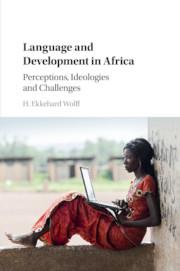Book contents
- Language and Development in Africa
- Language and Development in Africa
- Copyright page
- Dedication
- Dedication
- Contents
- Figures
- Maps
- Tables
- Preface
- 1 Introduction: approach, questions and themes
- 2 Background: Africa and the West – a difficult relationship
- 3 Perception: between ignorance, half-knowledge and distortion
- 4 De-marginalisation: the ‘cradle of humanity’ and home of human language
- 5 Re-conceptualisation: the overdue linguistic turn in development discourse
- 6 Challenges: linguistic plurality and diversity – problem or resource?
- 7 Future: synopsis and options for language planning
- 8 Agenda: arguments and steps
- 9 Basic sociolinguistic facts: languages, dialects, numbers of speakers
- Bibliography
- Glossary
- Index
- References
Bibliography
Published online by Cambridge University Press: 05 May 2016
- Language and Development in Africa
- Language and Development in Africa
- Copyright page
- Dedication
- Dedication
- Contents
- Figures
- Maps
- Tables
- Preface
- 1 Introduction: approach, questions and themes
- 2 Background: Africa and the West – a difficult relationship
- 3 Perception: between ignorance, half-knowledge and distortion
- 4 De-marginalisation: the ‘cradle of humanity’ and home of human language
- 5 Re-conceptualisation: the overdue linguistic turn in development discourse
- 6 Challenges: linguistic plurality and diversity – problem or resource?
- 7 Future: synopsis and options for language planning
- 8 Agenda: arguments and steps
- 9 Basic sociolinguistic facts: languages, dialects, numbers of speakers
- Bibliography
- Glossary
- Index
- References
- Type
- Chapter
- Information
- Language and Development in AfricaPerceptions, Ideologies and Challenges, pp. 305 - 315Publisher: Cambridge University PressPrint publication year: 2016



